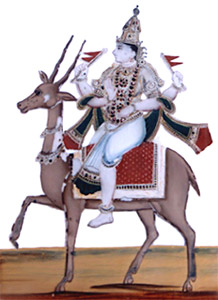 Lord Vayu belongs to the Cosmic Trinity of Sun, Fire and Air. He constitutes one of the five elements of the cosmos. He is believed to have been born from the breath of the Supreme Being. He is also known by names like `satata-ga`, `pavana`, and `gandhavaha`. The king of the Gandharvas is Lord Vayu. He is violent and has an immense speed. All over the universe and the heavens he roams about. Lord Vayu is affectionate as well has a rash character.
Lord Vayu belongs to the Cosmic Trinity of Sun, Fire and Air. He constitutes one of the five elements of the cosmos. He is believed to have been born from the breath of the Supreme Being. He is also known by names like `satata-ga`, `pavana`, and `gandhavaha`. The king of the Gandharvas is Lord Vayu. He is violent and has an immense speed. All over the universe and the heavens he roams about. Lord Vayu is affectionate as well has a rash character.
It is believed that he blew up the top of the mythical Mount Meru which fell into the sea, and is the present Srilanka. His lusts were random and had several illegitimate children. He was married to a daughter of Lord Vishwakarma. However he has had several offspring by many female characters of Hindu mythology. He is the father of Lord Hanuman and safeguards the north-west direction. Bhima is also considered as his son. Ila is considered as his daughter.
In the Brahmanic era, his status was reduced; however he still continues to occupy an eminent position in the Hindu mythology. He is portrayed as a destructive god who has a severe character and is subject to violent desires which he never tries to suppress. He is depicted as a fair complexioned man who is carrying a white flag and riding a deer.
On the western side of the Sumeru Mountain is the planet known as Nimlocani which is considered as the residence of Vayu.
In the hymns he is described as exceptionally beautiful. A white banner is his main attribute. Vayu Purana is dedicated to Lord Vayu. Lord Vayu is important for certain Hindu rituals. He is called by the name "the bearer of perfumes" and is a benign force who is a constant friend of Lord Vishnu.
This article is a stub. You can enrich by adding more information to it. Send your Write Up to content@indianetzone.com









